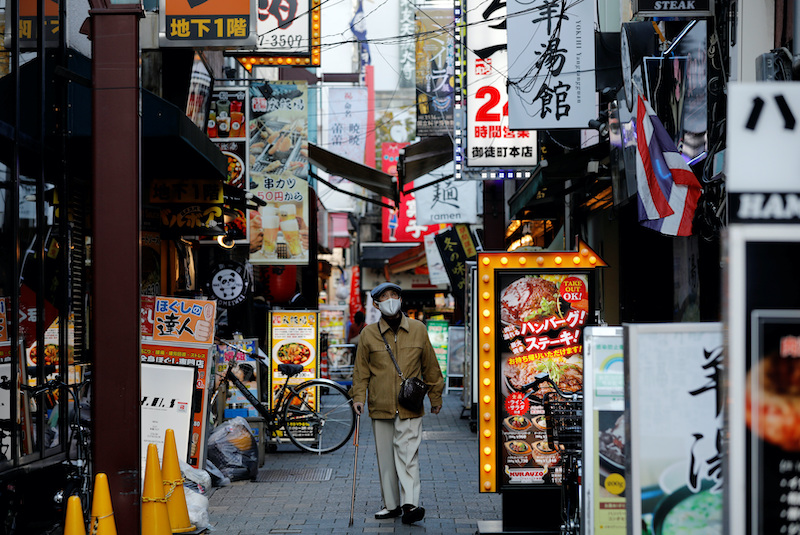The Japanese government said on Friday it will create an extra budget worth 29.6 trillion yen ($200.88 billion) to fund new spending to help households and business cope with rising living costs.
The total size of the package, including municipal government and corporate spending, will come to 71.6 trillion yen, including fiscal spending worth 39.0 trillion yen.
The huge outlay will includes items such as subsidies for households to offset rising gas and electricity prices and support for businesses raising wages. It is expected to boost gross domestic product by 4.6%, the government said.
“Our focus is to respond to rising prices, the weak yen, as well as promoting investment to raise wages and economic growth,” Prime Minister Fumio Kishida said before the package was finalised and approved by the cabinet.
Kishida’s administration pledged assistance this month, partly because the weak yen has ramped up the cost of imports and made it harder for households and companies to cope with higher fuel and food costs.
With his approval ratings plunging to levels that could make it difficult for him to carry out his agenda, the premier has been under pressure from ruling party lawmakers to ramp up the size of spending to ease the pain on households and retailers.
Household Power Subsidies
Under the package, the government will introduce subsidies to cut household electricity bills by roughly 20% from January to September next year.
It will also issue coupons to families with newborns, and extend a subsidy to curb gasoline prices.
Combined, these and other steps were likely to suppress the nationwide overall consumer price index by around 1.2 percentage points between January and September next year, a government estimate showed.
Nomura Research Institute estimates that spending under the package will likely boost Japan’s nominal gross domestic product (GDP) by 2.4%.
Could Weaken Yen
But Takahide Kiuchi, executive economist at the think tank, warned that ramping up spending at a time the economy is in fairly good shape could pose a danger for Japan, as it has the biggest public debt among major economies.
“The Bank of Japan’s extraordinary monetary easing and the government’s expansionary fiscal spending create a policy mix that erodes market trust in the yen,” said Kiuchi, a former BOJ board member. “This could accelerate unwelcome yen falls.”
Consumers also were doubtful about how much of an impact the measures would have, with some calling for even more drastic steps such as reducing the 10% consumption tax.
“If it goes back to 3%, the economy will very much be stimulated, but I think they can aim for 8%,” Takashi Sato, a 55-year-old company executive, said. “Ideally, I would like it to be 5% because then we would probably see GDP growth.”
Analysts expect the government to issue bonds to fund some of the spending, adding to Japan’s already huge debt pile.
The government has intervened in the currency market to combat the yen’s slide to 32-year lows, which are driven by the divergence between the BOJ’s ultra-low interest rates and steady rate hikes by the US Federal Reserve.
Yen Slips
On Friday, the yen weakened on Friday as the Bank of Japan held to its dovish stance, while the dollar tried to rebound across the board from losses early in the week on expectations the Federal Reserve will hint at slowing its aggressive pace of rate hikes.
The dollar was last up 0.8% against the yen at 147.43 after the BOJ left unchanged its -0.1% target for short-term interest rates and its pledge to guide the 10-year bond yield around 0%, as expected.
“We don’t plan to raise interest rates or head for an exit (from easy policy) any time soon,” BOJ Governor Haruhiko Kuroda said.
He said that if Japan was nearing 2% inflation they would change policy, but that would be clearly communicated to markets.
“You can still hear from Kuroda that he remains quite ambivalent about yen weakness. And he’s still basically wedded to the current policy settings of the BOJ. It’s basically telegraphing to the world that he’s not going to change tack anytime soon,” Alvin Tan, head of Asia FX strategy at RBC Capital Markets, said.
Talks to Buy US Cruise Missiles
Meanwhile, Japan is in the final stages of negotiations with the United States to buy US-made Tomahawk cruise missiles, the Yomiuri daily reported on Friday, citing multiple unnamed Japanese government sources.
Tomahawks can hit targets from more than 1,000km (620 miles) away, putting parts of China and the Russian Far East within range.
Tokyo is seeking its biggest arms buildup since World War Two in the face of Beijing’s rapid military modernisation and increased activity in nearby waters.
Chief Cabinet Secretary Hirokazu Matsuno said he was aware of the media report but refrained from commenting. “The government is considering about counterattack capabilities but no specifics have been decided,” he added.
Concern about Chinese military activity in the seas and skies around Taiwan and Japan has intensified since Russia invaded Ukraine in February, because Japan worries it provides China with a precedent for the use of force against Taiwan.
China in August fired missiles into waters less than 160km from Japan in a display of might, angered by US House speaker Nancy Pelosi’s visit to Taiwan.
At the 20th Communist Party Congress last week, Chinese leader Xi Jinping called for accelerating plans to build a world-class military. He said his country would never renounce the right to use force to resolve the Taiwan issue.
- Reuters with additional editing by Jim Pollard
NOTE: This report was updated with new details and the headline amended on October 28, 2022.
READ MORE:
Japan Spent $6bn in Monday’s Suspected Yen Intervention
Japan’s Inflation Hits 8-Year High, Tests BOJ’s Soft Policy
China’s Yuan Drops Near 15-Year Low After Investors’ Selloff
Japan Warns on Yen Sell-Off as Dollar’s Surge Continues
























